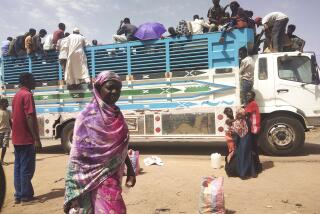A pledge of aid if Sudan opts for peace
- Share via
united nations -- If Sudan swiftly supports peacekeepers and talks to end the conflict in Darfur, the world will help rebuild the beleaguered region, ministers and other senior officials from more than two dozen nations said Friday in a high-level meeting on the region’s crisis.
While they praised the Sudanese government for having agreed to open talks with rebels next month and for finally allowing 26,000 foreign troops to help stabilize Darfur in the next year, participants in the three-hour meeting at U.N. headquarters found that every move forward was mined with obstacles.
The government in Khartoum, the Sudanese capital, has accepted a joint U.N.-African Union peace force, but insists that all the troops be from Africa. It has granted land for bases, but quibbles over airstrips. It has agreed to a cease-fire, but continues to attack rebels and civilians. It pledged access for aid workers, yet they are still frequently harassed and harmed.
“We must recognize what the Sudanese government has done in terms of progress, but this is not a blank check,” said AU chairman Alpha Oumar Konare. “We will do everything within our power to ensure that security is restored as soon as possible in Darfur.”
U.N. Secretary-General Ban Ki-moon announced the creation of a trust fund to help African nations that have offered troops but don’t have the equipment or transport to allow them to protect Darfur’s civilians.
Sudanese President Omar Hassan Ahmed Bashir has insisted that the peacekeeping force have an “African character,” because of the taint of colonization that affects the region. The demand has become a sticking point, because with 18 operations around the world, the United Nations’ peacekeeping department has had trouble mustering sufficient well-trained and well-equipped soldiers from Africa.
On Friday, Sudan’s foreign minister, Lam Akol, rejected soldiers and engineers offered by Uruguay, Thailand and Norway, saying African countries had pledged “190%” of needed troops.
“There are enough African troops for the operation, almost twice the number that are required,” he told reporters, rejecting suggestions that some of the military personnel were not up to U.N. standards.
The deployment -- scheduled to be completed by mid-2008 -- is three weeks behind schedule, but Britain’s minister of state for Africa, Mark Malloch Brown, suggested that a “significant first wave” of troops could be in Sudan by the end of the year.
“The issue now should be a technical one, not a political one,” he said. Malloch Brown is a former deputy U.N. secretary-general.
The ministers also discussed arrangements for peace talks set for Oct. 27 in Tripoli, Libya. Sudan’s government has said it is ready to negotiate with Darfur rebels who are demanding more resources from Khartoum, greater representation in the central government and compensation for victims of the conflict. But recently, the demands of the different rebel groups have escalated -- one is now asking for independence for Darfur -- and at least two rebel leaders are refusing to attend the talks.
Abdel Wahid, a leader of the Sudanese Liberation Movement who is in exile in Paris, said he refuses to join talks until the government honors past agreements to stop the violence in Darfur. U.N. officials consider his backing to be key for a peace pact’s success, and ministers at the meeting said he should participate or be excluded from all future talks or posts.
From Paris, Wahid wrote in a text message to The Times: “Hopefully, my people will get one thing if nothing else: Security.”
The officials -- from 26 nations, the European Union and the Arab League -- also said they would rather spend money on helping Darfur develop.
--
More to Read
Sign up for Essential California
The most important California stories and recommendations in your inbox every morning.
You may occasionally receive promotional content from the Los Angeles Times.










